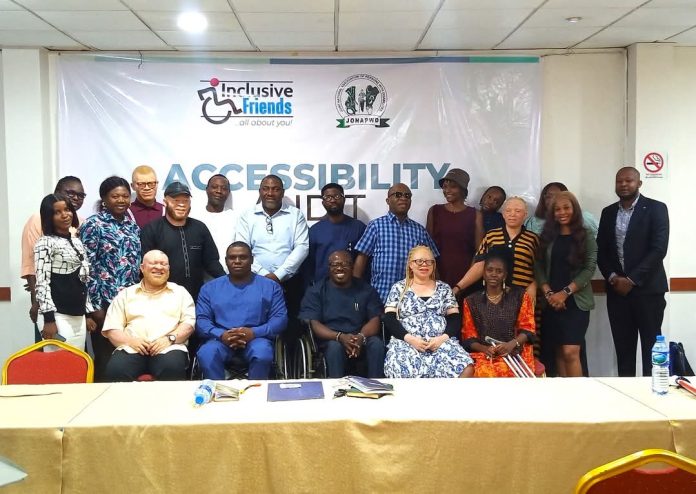In a groundbreaking effort to advance accessibility and inclusion for Persons with Disabilities (PWDs) in Nigeria, the Inclusive Friends Association (IFA) held a two-day workshop to train persons with disabilities on conducting accessibility audits. The workshop, held on December 16th and 17th, 2024, at Denis Hotel in Abuja, brought together 10 PWDs from various clusters to equip them with critical skills to assess accessibility in public and private institutions.
Empowering Voices Through Training
Speaking at the opening of the workshop, Grace Jerry, Executive Director of IFA, emphasized the transformative nature of the training, describing it as a step toward bridging accessibility gaps in Nigeria. She highlighted the importance of involving PWDs in the audit process, stating, “Who better to evaluate accessibility than those who face these challenges daily? This training equips participants with the tools to assess accessibility through the lenses of lived experiences, fostering advocacy and driving compliance with Nigeria’s Disability Act.”
Jerry also noted that accessibility compliance remains inconsistent across the country despite the Disability Act’s mandate, underscoring the urgent need for this initiative. She urged participants to amplify their learnings to advocate for greater accessibility in physical spaces, policies, and workplace environments.
Key Highlights of the Training
The workshop kicked off with participants being introduced to the fundamentals of accessibility audits. Facilitators from the Association of Accessibility Professionals Nigeria, including Yusuf Iyodo, Alilu Abdulmutalib, and Jimmy Ali, guided participants through interactive sessions that challenged current accessibility practices. Using the National Accessibility Regulation as a foundation, they worked collaboratively to refine a more inclusive audit checklist that meets national and international standards.
Day 2 delved deeper into the practical application of accessibility audits. Participants explored how to identify gaps in built environments, products, and services. The facilitators provided hands-on training on evaluating accessible entrances, parking spaces, internal wayfinding, toilets, and reception areas, among other critical aspects.
A practical session using the training venue, Denis Hotel, as a test facility, was a key highlight of the program. Participants conducted a live audit of the hotel’s built environment, applying their newly acquired skills. This experiential learning session reinforced their understanding of accessibility audits and their importance in fostering inclusion.
A Roadmap for Accountability and Advocacy
Beyond the training, IFA announced the launch of an Accessibility Compliance Dashboard. This innovative platform will serve as a public record, showcasing the accessibility levels of institutions across Nigeria. Jerry explained that the dashboard aims to hold organizations accountable while celebrating those that lead in accessibility compliance. “Through this tool, the world will see which organizations are driving change and which ones need to step up their efforts,” she remarked.
Additionally, audited organizations will receive further training to address identified gaps. This ensures that institutions are not only informed of their shortcomings but are also empowered with the tools to implement changes effectively.
Recognition and Certification
At the end of the two-day training, participants were awarded certificates of participation, signifying their readiness to take on the role of accessibility assessors. This certification is more than just a recognition—it marks the beginning of a larger movement to ensure accessibility for all.
In January 2025, these newly trained assessors will join IFA in conducting audits of five public and private institutions. This field exercise will consolidate their training and provide valuable insights into real-world accessibility challenges and solutions.
Building Partnerships for Change
The success of the training was attributed to collaborative efforts. Grace Jerry extended gratitude to the MacArthur Foundation and the Joint National Association of Persons with Disabilities (JONAPWD) for their unwavering support in making the initiative a reality. She also lauded the facilitators for their expertise and the participants for their commitment to advancing inclusion.
A Movement for a More Inclusive Nigeria
The Accessibility Audit Training underscores IFA’s commitment to building a society where no one is left behind. As the Disability Act continues to inspire hope for PWDs, this initiative paves the way for tangible action, fostering a culture of accessibility and inclusion.
For the participants, the training is not just a skill acquisition exercise—it’s a call to advocacy and transformation. As one participant noted, “This training has empowered me to see myself as an agent of change. I am ready to contribute to creating a more accessible Nigeria.”
As the workshop concluded, a clear message emerged: accessibility is not just a right—it is a necessity for an inclusive society. With initiatives like this, Nigeria is taking critical steps toward ensuring that PWDs can access opportunities and environments on equal terms with everyone else.


